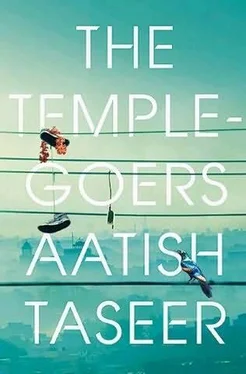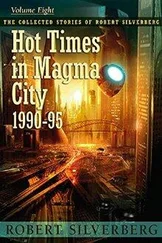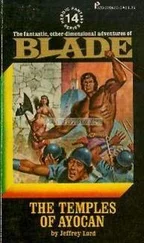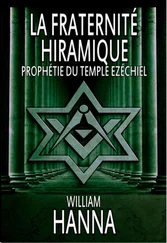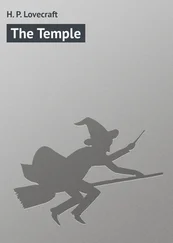On the ferry, Sanyogita’s words sang in my head: ‘I can’t compete with the other intimacies in your life.’ Their finality made what had felt like day-to-day life at the time now seem part of a chain of events. And many of the things I knew now, a feeling of waste, the destructiveness of the past few months, I hadn’t known earlier. It was as if life had carried me along, anaesthetized up to a point, then channelled me out.
On the boat – the slowest there was – men in baggy trousers and polyester shirts clung to the railings, reading about the murder. Their soft, damp newspapers thrashed about in the wind, but they read on, in Marathi, in Hindi and English, stopping occasionally to consider the latest smudged images. And it was only now, with the perspective endings bring, that I could look beyond my particularity and see that I had been close to a story that had riveted a country.
The sea changed from green to brown; oily, rainbow patterns ran over its surface. Red-bottomed, rusting freighters, some with Russian and Arab names, came into view. Then tall white buildings and the pale red domes of the Taj Hotel. Bombay’s mud-coloured water sloshed around us, bringing up plastic bottles and rose petals. We rocked in the brown water for a few minutes more, then gingerly disembarked. I was on the three p.m. flight to Delhi.
I had come to Delhi eleven months before to revise a novel. After college in America, I had lived for a couple of years in England, working as a reporter on an American news magazine. There I met an American journalist who read the novel I’d written in college and sent it along to an agent in New York. The agent wrote back a few days later, saying, ‘Finished your novel this weekend and was mightily impressed. You are a wonderful writer – hyper-observant and able to convey real emotion… I was totally involved with the narrator’s experience and the prose alone kept me riveted. Alas, the plot didn’t develop enough and sort of veered off course for me when I least expected it… But a voice like yours comes along rarely and I would love to work with you on this, or any other book you are working on. It is worth fixing!’ She also sent a separate editorial letter with a detailed list of suggested changes. I don’t know if I really believed in the book; what I did know was that I wanted to leave Britain and return to India.
My mother had argued hard to make my stepfather pay for college in America, and more for her sake than his, I didn’t want to return empty-handed. The agent was the ideal cover. My family in India didn’t know much about the workings of publishing, but they knew about advances; everyone knew about advances. And just flashing the edge of this golden ticket before the eyes of my mother, who in any case wanted me back, was enough. A wider circle of friends and family was persuaded that my time abroad had not been misspent. I, in the meantime, signed a contract with the agent and told her I was leaving my job. This alarmed her. ‘Go with your heart,’ she wrote. ‘Just remember there are no guarantees on advances (from passes, not interested to six-figure advances… everything is game), so take that out of the equation.’ I did; and in less time than I thought possible, I found myself on one of the new Jet Airways flights from London to Delhi.
The reading lights in the cabin were icy white. In the darkness, they refreshed a childhood memory of playing with torches under blankets. The spotlit whiteness; the knobbed, dark blue headrest that could be adjusted into a gorge for the base of the neck; the personal screens in economy; and the staff – young, polite college graduates – drifting by in blue and yellow, offering red wine as if they’d stolen it from their parents’ bar; these were the thrills of India’s first private international airline.
I ordered some wine and watched a new film. It was about four college friends who lead an idle life, drinking beer, skateboarding, riding fast bikes in an old Delhi ruin called the ‘classroom’. They are discovered by Sue, a young English girl trying to make a documentary about a group of Indian freedom fighters executed in the last days of the Raj by her grandfather, a British army officer. The grandfather had left behind a journal in which he had written of the courage the men showed and his own disenchantment with the colonial enterprise. The empire over, his granddaughter, six decades later, wants to use the group of young friends as actors in her documentary. But they resist her. And it turns out that their idle life and Western ways are more like a fear of life, a disillusionment with modern India. In a stolen, romantic moment, one of the boys says to Sue in Hinglish, ‘It’s been five years since I left university, but I’m here only. I just want to stay in university. On campus people know me; I have status. People say DJ will make something of himself. But out in the world, better DJs than me have been ground down in that crowd of millions.’ Another says, ‘What freedom, Sue? Have you seen the state of this country? No one believes this bullshit.’ But Sue prevails; the documentary is made; the young men begin to rediscover their history. They travel around India; they shoot the documentary; they run through fields, tearing off their T-shirts; sepia sequences of the documentary, with them playing the historical parts, are spliced into the film.
It must have been the altitude, the wine, or maybe just homesickness, but I suddenly found that I was crying. A kind of frightened euphoria at seeing India like this seized me. I muttered indistinct words to myself, tears ran down my face, my jaw hardened.
I reopened the screen and finished the film. It ended in carnage and nihilism. Just as the group of friends rediscover their country, a fighter-pilot friend of theirs dies when his MiG crashes. They watch it live on TVDelhi at a tea stall. The Minister of Defence, instead of taking responsibility for having bought bad parts, blames the pilot for the crash. This is too much for the group, so recently restored to idealism. They decide to assassinate the minister. One crime of passion and patriotism excites others and the film ends in further assassinations, patricides and the takeover of a radio station. In the closing scenes, commandos besiege the station where the friends are holed up, explaining their bloody deeds to the nation and welcoming callers. One by one – and on air – each of them is killed off; they bleed, laugh and sing as they die. Sue, in a taxi, listens to the broadcast.
I put away the screen and tried to sleep.
When I next opened my eyes, two flight attendants were walking past. They spoke in the dawn whispers that precede waking up the cabin for landing. Through a half-oval window, past dark sleeping figures, a thin fire burned precisely along the edge of a colourless sky. One of the attendants was a young woman with brown lipstick and hair held firmly in place by a wide clip. Her colleague was a tall man with darkening circles round his soft, attentive eyes. They were courteous, ambitious and bilingual. How different they were from the Indian Airlines ogres of my childhood. Those women with their boiled sweets and matronly tread, the stench of stove and state woven into their clothes, weary at serving men other than their husbands… were they the mothers of these bright, beautiful children?
Peering out of the white light at the two attendants, I attracted their attention.
‘Sir, may I serve you with anything?’ the man with dark, soft eyes asked.
The woman attendant smiled benignly, like a politician’s wife.
The cabin lights came on.
‘Lime water, please.’
‘Sir, right away.’
The attendants went off.
I was flicking through the last of the channels when, a few seats down from me, I noticed a large woman with black, dimpled arms transfixed by what she saw on her screen. Thin clouds raced across the video display, then a patchwork of fields in changing shades of green appeared, dotted with cement roofs, swimming pools and corrugated-iron sheds. Pale quarries with green water and coppery edges came into view. The wandering eye of the camera caught slum roofs, a blue and pink polythene waste dump and brownish, algal rivers choked with hyacinth. A red earth road ran like a vein through the land. The widening bulge of train tracks, the yellow and black of taxis and, at last, the striped walls of Delhi airport.
Читать дальше
